P2P Crypto Trading Risk Calculator
P2P Trading Risk Assessment
Risk Assessment Results
Estimated Safe Trade Amount
Potential Loss (Scam)
Risk Level
Recommended Platform
Safety Recommendations
- Trade only with users having 50+ completed trades and 98%+ rating
- Always use platform escrow system
- Never send money before crypto is locked
- Use separate phone number and email for crypto
- Withdraw crypto immediately to your wallet
In Egypt, buying Bitcoin isn’t a matter of logging into a local app and clicking ‘Buy.’ It’s a quiet, careful dance-done over WhatsApp, through bank transfers with coded messages, and on platforms that don’t show up in Google searches. The government doesn’t outright ban crypto. But it makes it nearly impossible to trade legally. So millions of Egyptians do it anyway-underground, peer-to-peer, and with real risk.
Why Banks Won’t Touch Crypto
The Central Bank of Egypt (CBE) doesn’t allow banks to process payments tied to cryptocurrency. Not for exchanges. Not for wallets. Not even for deposits. Law No. 194 of 2020 says you need a license to trade or promote crypto. Only the government can give those licenses. And they haven’t given any to local companies. So, no Egyptian exchange exists. No local app lets you buy Bitcoin with your NBE card. No ATM spits out ETH. The banks? They freeze accounts if they spot crypto-related transactions. One trader in Alexandria had his entire savings locked for six months after a small transfer to a Binance wallet. He never got an explanation. Just a letter saying his account was under review. That’s why Egyptians turned to P2P. Not because it’s safer. Not because it’s easier. But because it’s the only way left.How P2P Trading Works in Egypt
Peer-to-peer (P2P) trading means you buy or sell crypto directly from another person. No middleman. No bank approval needed. You agree on a price. You send money. They send Bitcoin. It’s simple. But in Egypt, it’s full of hidden rules. Most traders use Bybit P2P and Binance P2P. Both let you trade in Egyptian pounds (EGP). You can pay via bank transfer, mobile wallets like Vodafone Cash, or even cash drops in cafés. Some traders meet in person-coffee shops in Cairo, university campuses in Giza-handing over envelopes with cash while the other person releases Bitcoin from their wallet. Here’s how it works step by step:- You open the Binance or Bybit app and go to P2P.
- You search for sellers offering BTC or USDT in EGP.
- You pick a seller with high ratings and fast response time.
- You send EGP to their bank account or mobile wallet.
- You upload a screenshot of the payment to the platform.
- The platform holds the crypto until they confirm receipt.
- Once confirmed, the crypto is released to your wallet.
Who’s Trading, and Why?
It’s not just tech-savvy young men. It’s teachers, doctors, farmers, and shop owners. A 2025 report found 11.3 million Egyptians-nearly 10% of the population-are actively using crypto. The average person spends $61 a year on crypto trades. That adds up to $690 million in annual volume. Most buy Bitcoin. Not because they believe in decentralization. But because it’s the most liquid. If you need cash fast, Bitcoin is the easiest to flip. USDT (Tether) is popular too-it’s a stablecoin pegged to the dollar. When the Egyptian pound drops, people buy USDT to protect their savings. One trader in Luxor told me he bought $500 in USDT last month. Two weeks later, the pound lost 12% of its value. He didn’t lose money. He saved it. Even religious concerns haven’t stopped the rush. Dar al-Ifta, Egypt’s top Islamic authority, once called Bitcoin haram. But in 2023, they updated their stance: “If used responsibly and without speculation, digital assets are not inherently forbidden.” That gave millions permission to keep trading-now with a religious green light.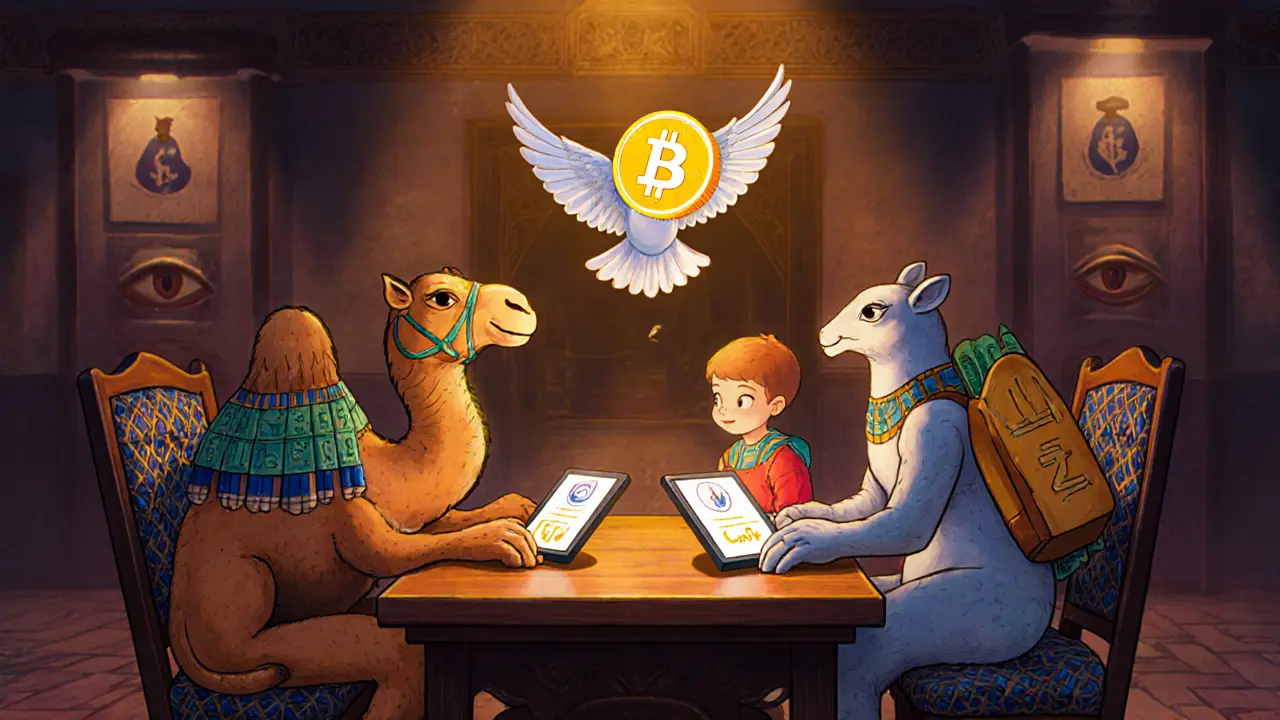
The Platforms That Keep It Alive
Not all platforms work in Egypt. Some block Egyptian IPs. Others shut down accounts overnight. The ones that survive? They adapt. Bybit P2P is the most popular. Why? It supports Arabic. It has no fees for P2P trades. It lets you pay with Apple Pay and Vodafone Cash. It even offers Shariah-compliant trading labels so users can filter for halal options. Binance is the second choice. It has more payment methods-bank transfers, debit cards, even cash deposit services through third-party agents. But it’s stricter. If you trade too much, they might ask for ID. And if you’re from Egypt? They watch you closer. Gate.io and OKX are used too, mostly by serious traders. Gate.io offers over 3,700 coins. That’s useful if you’re swapping between altcoins. OKX is preferred by small businesses that need to pay suppliers overseas without using banks. All of them have one thing in common: no customer service in Arabic. No local office. No legal recourse. If you get scammed, you’re on your own.The Risks Are Real
You can’t trust the system. You can’t trust the bank. You can’t even fully trust the person on the other side. Scams happen. Someone sends a fake payment screenshot. You release the crypto. They disappear. One trader in Mansoura lost $3,000 last year because he trusted a seller who claimed to be a “verified merchant.” The platform didn’t flag him. He had a 98% rating. Turns out, he used fake accounts to build it. Bank freezes are common. Traders report accounts locked for weeks after just one crypto-related transfer. Some have been forced to close businesses because their business accounts got flagged. And then there’s the law. Law No. 194 doesn’t say “you’ll go to jail.” But it says unlicensed trading is illegal. The government hasn’t prosecuted a single retail trader yet. But they’ve cracked down on crypto influencers who promoted trading on TikTok. Several were fined. One was banned from social media. Traders know the risks. They don’t use their real names. They avoid video calls. They don’t post screenshots online. They use encrypted apps like Signal for communication. They keep small balances on exchanges-just enough to trade. The rest? Stored in hardware wallets tucked in drawers, under mattresses, buried in boxes.
What’s Next?
The government isn’t ignoring crypto. They’re watching it. Egypt’s Ministry of Communications is testing blockchain for land titles and digital IDs. They’ve partnered with foreign firms to build private blockchain networks. That means they understand the tech. They just don’t want ordinary people using it. For now, the underground market thrives. No new laws are coming in 2025. No licensed exchange is launching. The Central Bank hasn’t budged. So traders keep adapting. Some are moving to DeFi platforms. Others are using crypto to send money to family abroad-bypassing Western Union fees. A few are even starting small crypto-based businesses: a bakery in Aswan that accepts USDT, a tutoring service in Port Said that pays teachers in Bitcoin. The system isn’t perfect. It’s risky. It’s messy. But for millions of Egyptians, it’s the only way to protect their money, reach the global economy, and survive a broken banking system.What You Need to Start
If you’re in Egypt and want to try P2P trading:- Use only well-known platforms: Bybit or Binance. Avoid random sites.
- Start small. Trade $20-$50 first to test the process.
- Always use escrow. Never send money before the crypto is locked.
- Only trade with users who have 50+ completed trades and 98%+ rating.
- Use a separate phone number and email just for crypto.
- Withdraw your crypto to a wallet you control-never leave it on the exchange.
- Never share your 2FA code. Ever.
Is it illegal to trade crypto in Egypt?
It’s not explicitly illegal to own or trade crypto in Egypt, but it’s heavily restricted. The Central Bank of Egypt bans banks from handling crypto transactions and requires a license to operate any crypto service-licenses that haven’t been issued to local companies. So while you won’t go to jail for buying Bitcoin on P2P, you’re operating in a legal gray zone with no consumer protection.
Which P2P platforms work best in Egypt?
Bybit P2P is the most popular because it supports Egyptian pounds (EGP), has zero trading fees, offers Arabic language support, and accepts payments via Vodafone Cash, Apple Pay, and bank transfers. Binance P2P is the second most used, with more payment options but stricter account reviews. Gate.io and OKX are also used, especially for altcoins and institutional trading.
Can I use my Egyptian bank account to buy crypto?
No. Egyptian banks are prohibited from processing crypto-related payments. If your bank detects a transfer to a crypto exchange, they may freeze your account. Traders bypass this by using P2P platforms and sending money directly to another person’s account-often using mobile wallets or cash. The bank never sees the word “crypto,” so the transaction looks like a regular payment.
Is Bitcoin haram in Egypt?
In 2018, Dar al-Ifta declared Bitcoin haram. But in 2023, they revised their stance, stating that digital currencies are not inherently forbidden if used responsibly and without speculation. Many Egyptians now consider crypto halal, especially when used to protect savings from inflation or for legitimate transactions.
How do I protect myself from scams on P2P?
Always use the platform’s escrow system-never send money before the crypto is locked. Only trade with users who have 50+ completed trades and a 98%+ rating. Avoid sellers who push you to use WhatsApp or Telegram without platform protection. Never share your 2FA codes, private keys, or screenshots of your wallet. If something feels off, walk away.
What happens if my bank freezes my account?
If your bank freezes your account over a crypto-related transaction, you’ll likely get a letter saying your account is under review. You may need to visit the branch in person, explain your transactions, and prove they weren’t illegal. Many people end up closing the account rather than fighting it. The bank won’t admit why they froze it-just that it violated their internal policies.
Is crypto trading growing in Egypt?
Yes. Despite restrictions, Egypt’s crypto market is projected to generate $690 million in revenue by 2025, with over 11 million users. It leads North Africa in crypto value received. Demand is driven by inflation, currency devaluation, and lack of access to global financial tools. P2P trading continues to grow because there’s no legal alternative.
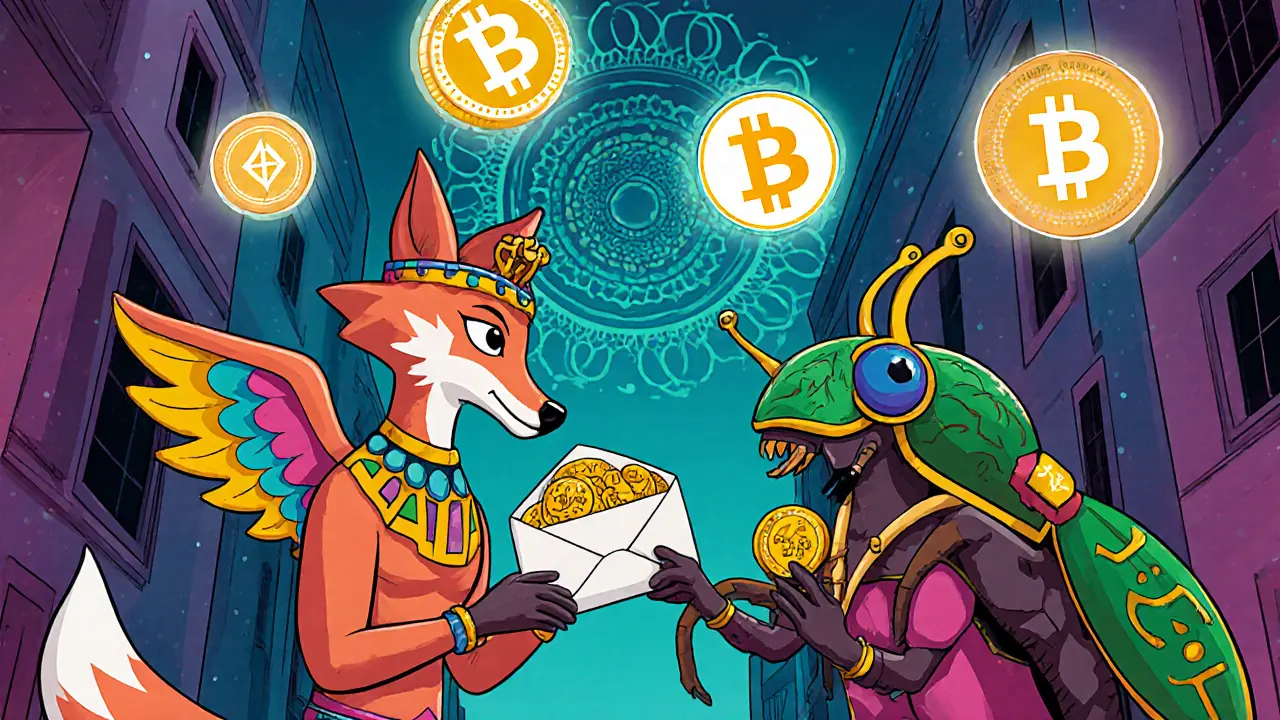
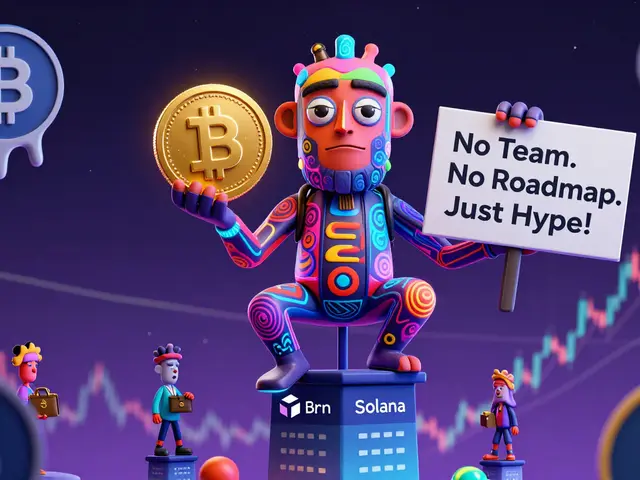
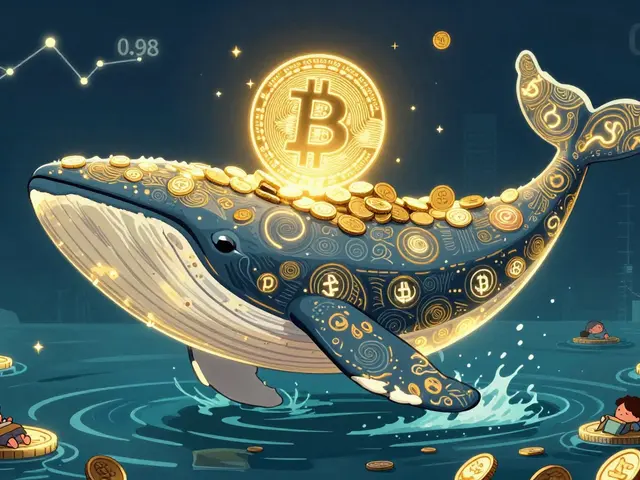
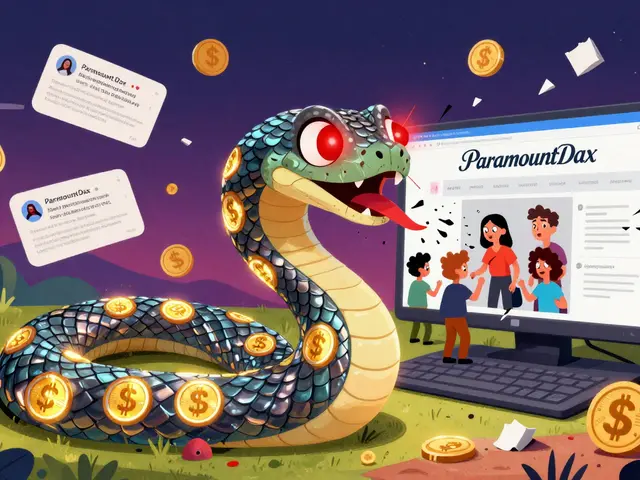

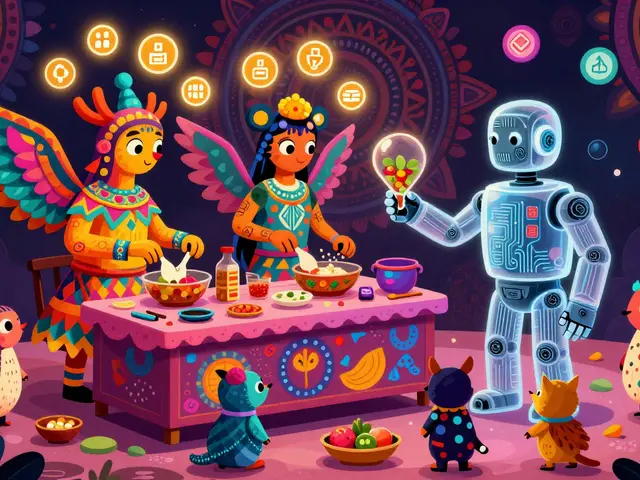
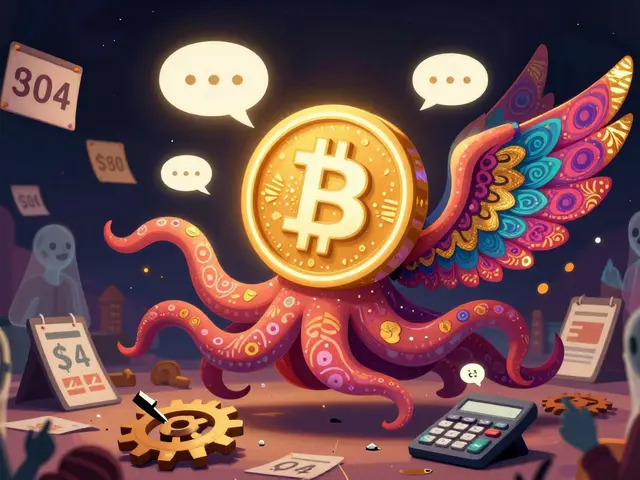

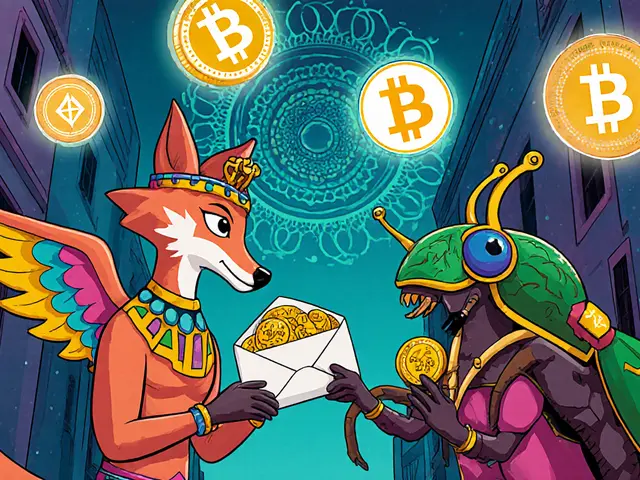

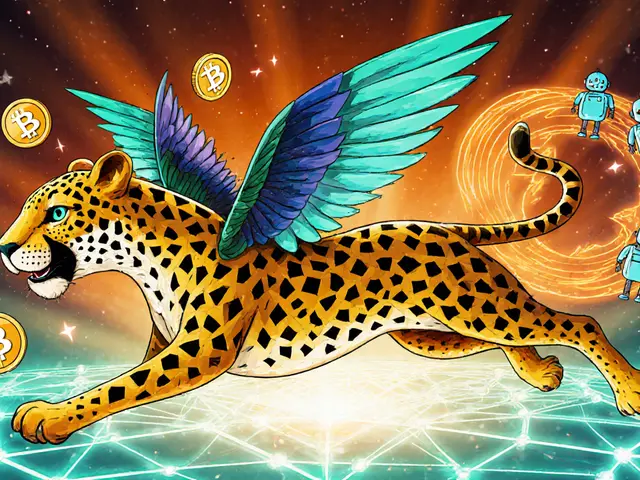
20 Comments
This is a dangerous illusion. Governments don't allow crypto because it undermines their control over money. Egypt is just the latest example of how authoritarian systems crush financial freedom. People think they're being clever using P2P, but they're just playing into a system designed to exploit them. No amount of coded language or WhatsApp deals changes the fact that you're trading in a legal black hole with zero recourse. This isn't survival-it's desperation dressed up as innovation.
And don't get me started on the religious justification. Dar al-Ifta changed their stance because they're afraid of losing relevance, not because they've had a moral epiphany. This isn't halal finance-it's financial anarchy wrapped in spiritual euphemisms.
So let me get this straight-millions of Egyptians are risking bank freezes and legal gray zones to buy Bitcoin so they can… preserve their savings from inflation?
Wow. The most advanced financial innovation of the 21st century is a workaround for a currency that’s collapsing because of bad governance. I’m not impressed. I’m just sad. We built blockchain to decentralize power, not to let people hide cash under mattresses because their central bank is a cardboard box.
Also, ‘digital gold’? Please. Gold has 5,000 years of cultural weight. Bitcoin has a whitepaper and a bunch of people typing ‘transfer’ in WhatsApp.
Everyone’s acting like this is some revolutionary movement but it’s just people being dumb with tech
you think using bybit is safe but they can freeze you anytime and you have no rights
and why are you trusting strangers on the internet with your life savings
also who says you need crypto to survive inflation just buy food and hold cash in dollars if you can
and dont even get me started on the 11 million users number thats probably inflated by bots and people who traded once and forgot about it
this whole thing is a glorified flea market with blockchain branding
I appreciate how this piece highlights the human side of crypto without sensationalizing it. What’s happening in Egypt isn’t about speculation-it’s about dignity. People are finding ways to protect their families from economic collapse when the institutions meant to support them have failed. The fact that teachers and farmers are using P2P to safeguard their savings speaks to a deeper truth: when systems break, people build new ones.
I don’t know if this is the future of finance, but I know it’s the present of resilience. And that deserves respect, not judgment.
Man I love how people just figure stuff out when they have to
no bank? no problem
use vodafone cash
no legal way? just use code words
scared of getting caught? keep your crypto offline
they’re not tech geniuses-they’re just people trying not to get screwed by a broken system
and honestly? more power to them
if this is the future of money then at least it’s real
not some Wall Street casino with a blockchain sticker on it
This is one of those stories that reminds me how deeply human finance really is. It’s not about algorithms or decentralization-it’s about trust, survival, and the quiet courage of ordinary people doing what they must to protect what’s theirs.
I’m struck by how carefully they navigate risk-not with grand gestures, but with small, disciplined habits: using separate emails, avoiding video calls, keeping balances low.
There’s a quiet wisdom here. Maybe the real lesson isn’t about crypto-it’s about how people build safety nets when the official ones have collapsed.
Oh please. Don’t romanticize this. This isn’t resilience-it’s a scam magnet. People are getting robbed left and right, accounts are frozen, and no one’s held accountable. And you call this ‘survival’? No. This is financial PTSD.
And the fact that people are using ‘digital gold’ as a euphemism for Bitcoin? That’s not clever. That’s delusional. You think a 98% rating means anything when someone’s using 10 fake accounts to build it?
And don’t even get me started on the religious justification. You’re telling me a fatwa changed because people wanted to feel better about stealing from their own government? That’s not faith-that’s cognitive dissonance with a smartphone.
This isn’t innovation. It’s a slow-motion train wreck and everyone’s cheering because they think they’re on the express lane.
It’s disgusting how people treat money like a game. You think it’s fine to risk everything because ‘the system is broken’? No. The system is broken because people like you keep exploiting loopholes instead of demanding real change.
And now you’re using religion to justify it? ‘Halal crypto’? That’s not spirituality-that’s moral bankruptcy wrapped in a blockchain.
You’re not protecting your savings. You’re gambling with your future. And you call it survival? It’s just another form of greed dressed up as necessity.
Interesting how the most grassroots financial movement in decades is happening outside the system-no lobbyists, no PR teams, no venture capital.
Just people. With phones. And a lot of fear.
I’m not sure if this is a solution or a symptom. But I do know that when people start using Signal instead of WhatsApp for crypto deals, you know the stakes are real.
Maybe the real story isn’t the crypto-it’s the silence they’ve learned to keep.
11 million users? That’s not a market. That’s a panic.
690 million in volume? That’s not adoption. That’s a currency collapse.
They’re not choosing crypto. They’re being forced into it.
And the fact that they’re using Vodafone Cash instead of banks? That’s not innovation. That’s desperation with a UI.
Also the ‘digital gold’ thing is a joke. Gold doesn’t disappear if your wallet gets flagged.
This isn’t the future. It’s the aftermath.
The normalization of financial lawlessness under the banner of ‘survival’ is a dangerous precedent. Egypt’s Central Bank has not failed-it has been deliberately undermined by a population that refuses to engage with legitimate reform. P2P trading is not a workaround. It is a rejection of civic responsibility.
When individuals choose anonymity over accountability, they do not empower themselves-they erode the very foundations of economic order. The fact that this behavior is being celebrated as ‘resilience’ is a symptom of a broader cultural decay.
There is no moral high ground in circumventing legal frameworks designed to protect the integrity of monetary systems. This is not innovation. It is anarchy.
What’s happening in Egypt isn’t about Bitcoin or USDT
it’s about the collapse of trust
trust in banks
trust in government
trust in the idea that your money will be safe if you just follow the rules
and now people are building their own trust networks-through WhatsApp messages and coded phrases and strangers in coffee shops
they’re not trading crypto
they’re trading hope
and the fact that it works at all
is both beautiful and terrifying
because if this is what democracy looks like now
then maybe we’ve already lost the institutions
and are just waiting for the rest of the world to catch up
Honestly this is kinda beautiful in a weird way
people are making their own rules because the system gave them nothing
and they’re not asking for permission
they just use vodafone cash and move on
no one’s got time for bureaucracy when your salary disappears every month
and the fact that they’re using halal labels? genius
they’re not just trading crypto
they’re redefining what’s possible
and honestly? we should be paying attention
not judging
It is interesting to see how people adapt when formal systems fail. In India, we also have informal ways of saving and transferring money, especially in rural areas. The use of mobile wallets and peer-to-peer networks is not new. What is new is the technology behind it. Still, the human behavior is the same-trust, caution, and necessity drive action.
It is not about crypto. It is about survival.
What we are witnessing in Egypt is not merely a financial phenomenon-it is a metaphysical reclamation of autonomy. In a world where monetary sovereignty has been ceded to technocratic institutions and opaque regulatory regimes, the individual-armed only with a smartphone and a coded phrase-has reasserted the fundamental right to self-sovereignty over capital.
The blockchain, in this context, is not a ledger of transactions. It is a covenant of dignity. Each transfer is a silent rebellion against the erosion of economic agency. The use of ‘digital gold’ is not metaphor-it is liturgy.
And when Dar al-Ifta revised its stance, it did not capitulate to market forces. It recognized the sacredness of preservation in the face of systemic decay.
This is not underground finance. This is the emergence of a new moral economy-one forged not in boardrooms, but in cafés, in mobile wallets, in the trembling hands of a teacher who chooses to protect her children’s future.
i just read this and started crying
not because i’m sad
but because i realized how lucky i am to live where i can just buy crypto on coinbase without worrying if my bank will lock me out
these people are so brave
and they don’t even think of themselves that way
they just do it
and i feel guilty for complaining about gas prices
and i keep thinking about the woman in luxor who bought 500 in usdt and saved her savings
what if that was me
what if i had to hide my money under my mattress
i don’t know how to fix this
but i want to listen more
This is a textbook case of decentralized financial inclusion via P2P mesh networks operating under hyperinflationary conditions. The absence of licensed intermediaries has catalyzed a bottom-up liquidity layer built on trustless escrow protocols and mobile payment integrations-essentially creating a sovereign financial substrate outside the traditional banking stack.
Bybit’s Arabic interface and Shariah-compliant filters are not UX features-they’re cultural adaptation layers enabling mass adoption in a regulatory vacuum. The real innovation isn’t crypto-it’s the emergent compliance architecture built by users themselves.
Also, the 11M user figure? That’s not adoption-it’s a network effect triggered by economic desperation. The velocity of EGP-to-USDT swaps is the true indicator of market health here.
I don’t know much about crypto, but I do know what inflation feels like. My parents lost everything in the 2008 crash. I don’t know if this is right or wrong, but I get why people are doing it.
It’s not about being tech-savvy. It’s about not wanting to lose everything again.
And if the only way to protect your money is to use WhatsApp and hope the person on the other side doesn’t scam you… then maybe the system is the problem, not the people.
Reading this made me think about how we all carry invisible economies in our lives.
In Egypt, it’s WhatsApp and Vodafone Cash.
In my hometown, it’s bartering homemade bread for babysitting.
In my friend’s village in Nigeria, it’s mobile airtime as currency.
Money isn’t just what’s printed on bills.
It’s what we agree to value.
And right now, in Egypt, people are agreeing-quietly, carefully-that Bitcoin is worth more than the pound.
That’s not illegal.
That’s human.
Man I just read the part about the guy in Alexandria with his savings locked for six months
and I thought-man, that’s not a bank freeze
that’s a slow murder of dignity
and yet he’s still trading
still using code words
still hiding wallets under mattresses
and I’m sitting here complaining about my credit card interest rate
we need to stop acting like this is a tech story
it’s a story about people refusing to be broken